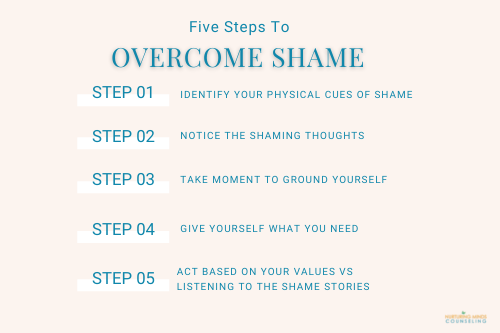Imagine you’ve been invited to an important work meeting to discuss upcoming ventures at your company. You’re low-key, super excited that you got to be part of it since all the bigwigs will be there but are struggling to decide whether to speak up. Your mind goes back and forth from “I should contribute, make my voice known, to this could go so terribly wrong.” You finally decide to put an idea forward and crickets… No one shoots it down, but no one comments on it. The meeting has moved on before you know it, but it feels as if time has stopped for you. It’s like you’ve entered this weird twilight zone moment (cue the eerie background music). You feel a desire so strong to run that you have to stop yourself from getting up—a sensation of heat in your cheeks creeps up, your heart starts pounding, and your mind keeps replaying the scene. You’re so sure that others were giving you weird looks when you spoke up too. Lo and behold – You’re in the grips of shame!
What is Shame?
Before you can learn how to overcome shame, you first need to understand what shame is and spot it.
I happen to be very familiar with recognizing shame because:
- I’m trained in a model called The Daring Way ™ that explores different thoughts, emotions, and behaviors that hold people back from living more authentic lives. Spoiler alert: Shame is a big one!
- I am a human being who experiences it regularly (like most other human beings).
Dr. Brené Brown describes shame as the
“painful feeling or experience of believing that we are flawed and, therefore, unworthy of love and belonging” for whatever reason.
Whenever you have the thought, “I’m not good enough because of ____________ (fill in the blank), that’s a massive clue that you’re in the midst of shame.
We often think that shame is only present when we are ashamed of some deep, dark, terrible skeleton in our closet (which could trigger shame). But, in reality, shame is more of an everyday experience that shows up more often than you think. It shows up in your life whenever you start to question your sense of worth, belonging, and lovability. It shows up when you’ve made the brave and scary decision to put yourselves out there, and you fall flat on your face metaphorically (or literally depending on the situation). Shame is present when you fear disconnection and rejection from others. That can include people you know or an imagined audience of people you don’t know (think of being publicly shamed on Twitter).
Here are some concrete examples of how shame can show up in your life:
- You question whether you’re good enough to apply for that promotion or start your own business
- You ask whether you’re just too much (too needy or too cold) in your relationship and fear that your partner will get tired of you
- You feel slimed on when you disclose your infertility challenges with a friend and feel shut down
- You feel less than when you get rejected by that person on Bumble
- You doubt yourself at work and question whether you’ve done or said the right thing (cue the opening example)
- You feel like crap after another parent asked you why you haven’t volunteered to be the class mom
Overcoming shame can be tricky because it’s so sneaky sometimes. It can show up in all these unexpected areas of your life. And when you’re in a shame storm, it truly feels uncomfortable. The fear of not being enough and ultimately of disconnection is so scary for us mammals.
When you’re a baby, you need a connection to a caregiver to survive. Hence whey it’s become such an essential part of your makeup. And even when you no longer need others to survive physically, you are still hardwired to have the desire to feel seen, heard, and connected with others. This need will be part of your entire life; it’s just part of being human. So the possibility that you might get rejected or feel like you’re not enough can trigger some primal fear in you.
A famous study was done by Harry Harlow back in the ’60s gets me every time and perfectly illustrates this need. They had baby monkeys (think Marcel in Friends) exposed to two different types of moms.
- Fake Mom #1 was just kind of like this metallic, robotic thing that had a bottle of milk to feed them but no sense of cushy comfort – she was just metal.
- Fake Mom #2 was still a robotic thing, but they had wrapped in a warm cozy covering to mimic being in a mother’s genuine embrace of nurturance and warmth. Think of the experience of getting the best bear hug imaginable. This mom had no bottle of milk, so no food to feed them.
They hypothesized that after being exposed to both and given the choice of which mother to go with, they would pick Fake Mom #1 because she’s giving them food to stay alive. Well, to their shock and surprise, the baby monkeys consistently chose to spend more time with Fake Mom #2 even though she had no milk to give them. The sense of warmth, connection, and nurturance were as crucial to these baby monkeys. And, like it or not, we share many similarities with our monkey primates.
Hence why shame can be so painful and so convincing at times. Shame tries to convince you to do whatever it takes to protect yourselves from being rejected/hurt. It compels you to armor up and defend yourselves from disconnection. It tells you that you don’t have what it takes to put yourselves out there and be vulnerable. Like at the meeting when no one responded to your idea.
But the cost of shame is that you end up living a life that might be playing it safe, out of alignment with your values, and overall inauthentic. In other words, shame might not be worth the cost. So how can you learn to overcome shame?
5 Steps for Overcoming Shame
- The first step is being able to recognize that you’re in the grips of shame. The good news is that shame is a visceral experience, and there are typically warning signs that you’re experiencing it. A helpful tip is to start honing in on your physical symptoms of shame.
- When I experience shame, I feel ______________ (fill in physical symptoms) in my body.

- For example, when I experience shame, I feel an emptiness in the pit of my stomach.

- Ok, you’ve recognized you’re in shame because you’ve honed in on the physical clues. Now it’s essential to identify what are the thoughts that are contributing to your shame. Some common thoughts include:
- “I’m not enough because I’m not _______________ (ex: smart, successful, rich, thin, loving, powerful, etc) enough”.
- “Who do you think you are? You can’t do _________ (fill in the blank with risk-taking action)”.
- “I’m not as good as________________ (fill in blank with someone you compare yourself too).
It’s also helpful to understand your common shame triggers to prepare further/know when you’re confronted with these situations.
- I start questioning my worthiness when it comes to my ________________(fill in blank with a shame trigger).
- For example, I start questioning my worthiness when it comes to my parenting.
- Now that you’ve recognized the thoughts that are contributing to your shame storm. The next step is to take a moment to center yourself. That can look like:
- Doing some deep breathing exercises
- Using a grounding exercise like soles of the feet or using your senses to come back to the moment
- Any other mindfulness exercise
- Taking a walk
- Pausing for a moment
- Moving your body somehow
- Now that you’re centered, you need to figure out what you need at this moment. That can look:
- I need to validate my experience and recognize that my thoughts aren’t helping me.
- I need to take a self-compassionate break and speak to myself the same way I talk to my friend.
- I need to get back to my present moment and focus on what’s happening here and now (until I have time to process it).
- I need to phone a friend, so I can vent and get support.
- I need to journal my thoughts and feelings for a moment.
- Then, you get to decide if you want to listen to the shaming messages or choose to do something courageous (and scary) that aligns with your values.

Let’s use the previous example to apply these steps:
- Once you realize time has slowed down. You would take that cue to check in with your body. You would notice the heat in your cheeks, your heart racing, and the desire to run.

- You focus on your thoughts and identify the thought, “I’m so stupid for speaking up; who do I think I am contributing to the bigwigs?!” And maybe later, you can dive deeper and recognize there’s a common theme of “I’m not smart enough to engage with the bigwigs.” You also realize that work meetings with the executes are a common shame trigger.
- You can then take a low-key deep breath or at least tune in to your experience of breathing in that moment. Maybe even doodle a bit to help ground you, re-focus on who’s speaking, and try to be present for the rest of the meeting.
- After the meeting, you decide to call a trusted colleague or friend to receive support or check those shame stories.
- You then get to decide whether you will buy into those shame stories which tell you “you are not smart enough to contribute and you should absolutely never ever again put yourself out there.” Or recognize that you had an experience of shame that happens to everyone and you will not get hooked by these shaming thoughts. You decide that next time you’re at a similar meeting, you will follow the steps to overcoming shame and speak up again. You do this because it’s in line with your value of Confidence rather than buying into those shame stories.
If you are struggling with feelings of shame and need some help overcoming shame, schedule you’re complimentary consult here. If you want to stay up to date on the latest content and other helpful tools, sign up for my biweekly newsletter here. Lastly, I encourage you to continue nurturing your mind, body, and soul.
